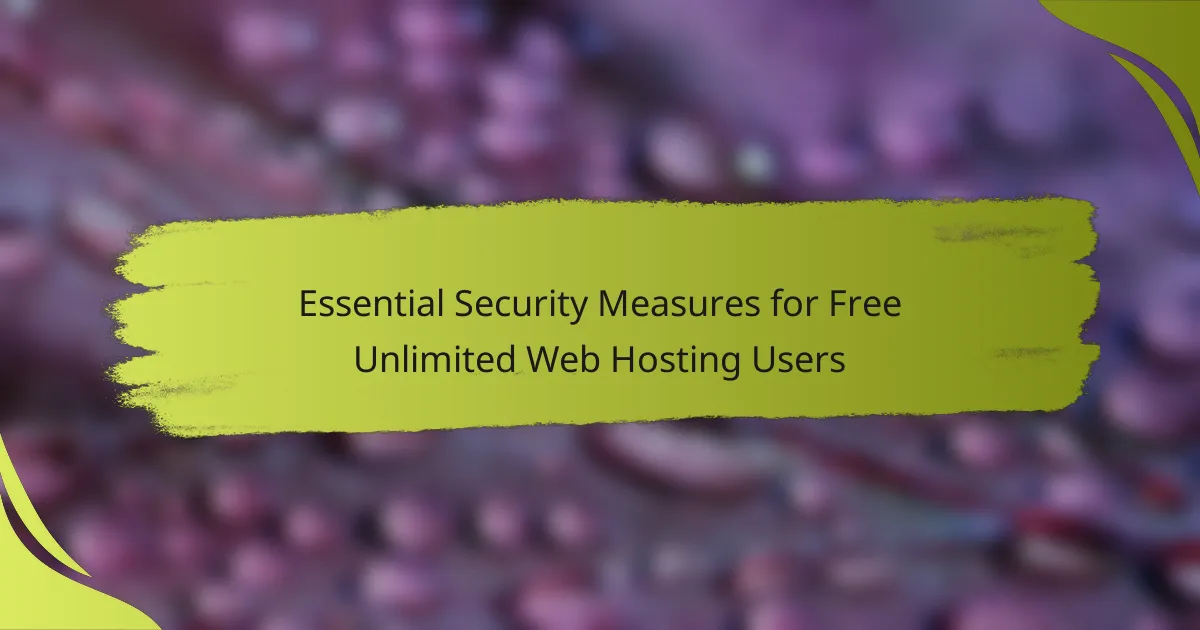Free unlimited web hosting users must take proactive steps to secure their websites against various threats. By implementing essential security measures such as data encryption, access control, and active monitoring, users can significantly enhance their site’s safety and protect sensitive information from unauthorized access. Awareness of the inherent risks associated with free hosting services is crucial for maintaining a secure online presence.
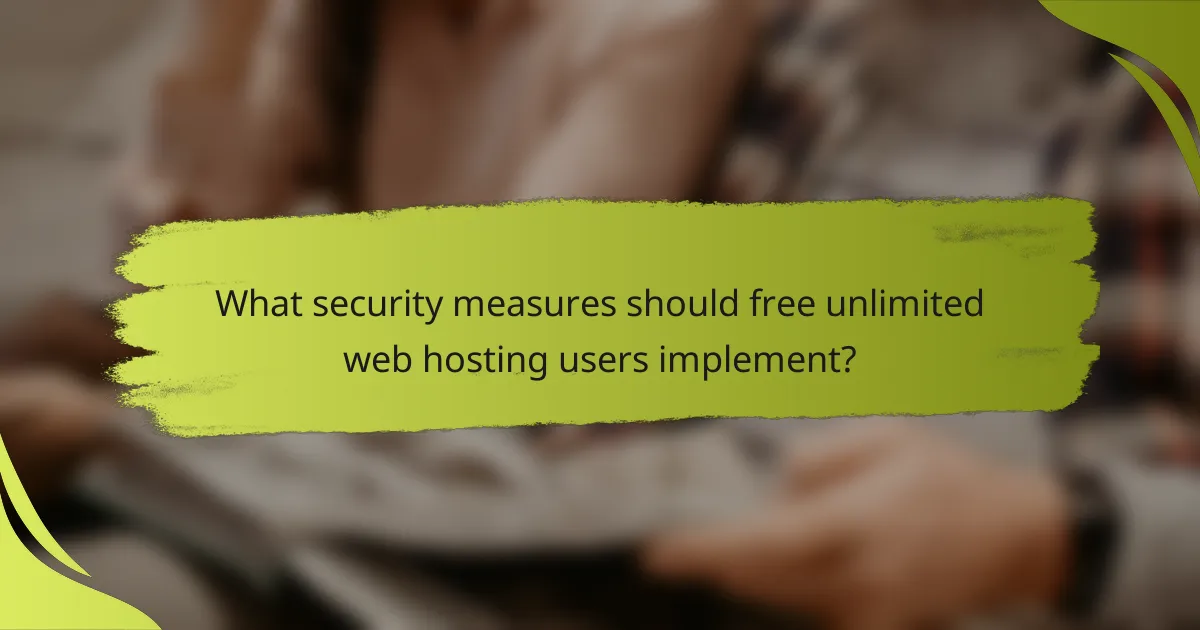
What security measures should free unlimited web hosting users implement?
Free unlimited web hosting users should prioritize several essential security measures to protect their websites from potential threats. Implementing these measures can significantly reduce vulnerabilities and enhance overall site safety.
Regular software updates
Keeping software up to date is crucial for maintaining security on your web hosting platform. Regular updates patch known vulnerabilities, making it harder for attackers to exploit outdated systems. Aim to check for updates at least once a month.
Many hosting providers offer automatic updates, but it’s wise to manually verify that all components, including plugins and themes, are current. If you notice any outdated software, prioritize updating it immediately.
Strong password policies
Implementing strong password policies is a fundamental step in securing your web hosting account. Passwords should be at least 12 characters long, combining uppercase letters, lowercase letters, numbers, and special characters. Avoid using easily guessable information like birthdays or common words.
Consider using a password manager to generate and store complex passwords securely. Regularly change your passwords, ideally every three to six months, to further enhance security.
Two-factor authentication
Two-factor authentication (2FA) adds an extra layer of security to your web hosting account. By requiring a second form of verification, such as a text message code or authentication app, it makes unauthorized access much more difficult.
Enable 2FA through your hosting provider’s settings if available. This simple step can significantly reduce the risk of account compromise, especially if your password is leaked.
SSL certificate usage
Using an SSL certificate is essential for securing data transmitted between your website and its visitors. SSL encrypts information, protecting sensitive data like login credentials and payment details from interception.
Most hosting providers offer free SSL certificates through services like Let’s Encrypt. Ensure that your SSL certificate is properly installed and configured to enhance trustworthiness and improve search engine rankings.
Regular backups
Regular backups are vital for recovering your website in case of data loss due to hacking or technical failures. Schedule automatic backups at least weekly, and store them in multiple locations, such as cloud storage or external hard drives.
Test your backups periodically to ensure they can be restored successfully. This proactive measure can save you time and resources in the event of a security breach or data loss incident.
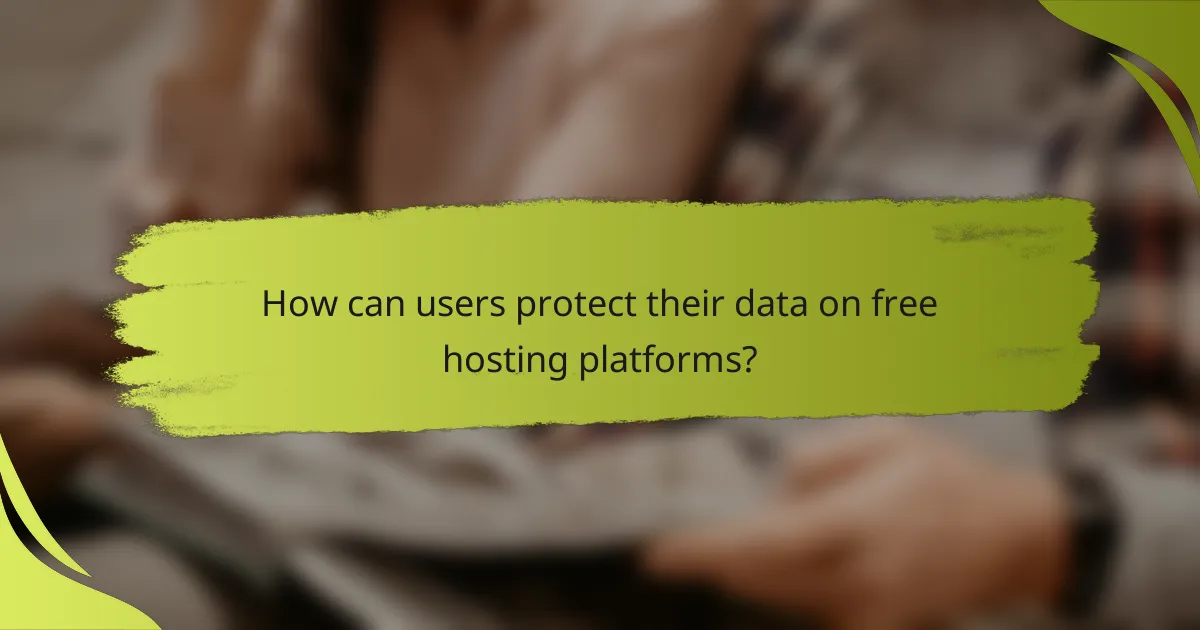
How can users protect their data on free hosting platforms?
Users can protect their data on free hosting platforms by implementing security measures such as data encryption, access control settings, and active monitoring for suspicious activity. These steps help safeguard sensitive information from unauthorized access and potential breaches.
Data encryption techniques
Data encryption techniques involve converting information into a coded format that can only be accessed by authorized users. For free hosting users, utilizing SSL (Secure Socket Layer) certificates is crucial, as it encrypts data transmitted between the user’s browser and the server.
Additionally, consider using end-to-end encryption for sensitive files before uploading them to the hosting platform. This ensures that even if data is intercepted, it remains unreadable without the proper decryption key.
Access control settings
Access control settings allow users to manage who can view or edit their data on free hosting platforms. It is essential to set strong, unique passwords and enable two-factor authentication (2FA) where available to add an extra layer of security.
Regularly review user permissions and remove access for individuals who no longer need it. Limiting access to only those who require it minimizes the risk of unauthorized data exposure.
Monitoring for suspicious activity
Monitoring for suspicious activity involves regularly checking logs and alerts for any unauthorized access attempts or unusual behavior on your hosting account. Many free hosting services offer basic monitoring tools that can notify users of potential security threats.
Establish a routine for reviewing these logs, ideally weekly, to catch any anomalies early. Consider setting up alerts for specific actions, such as failed login attempts, to respond quickly to potential breaches.
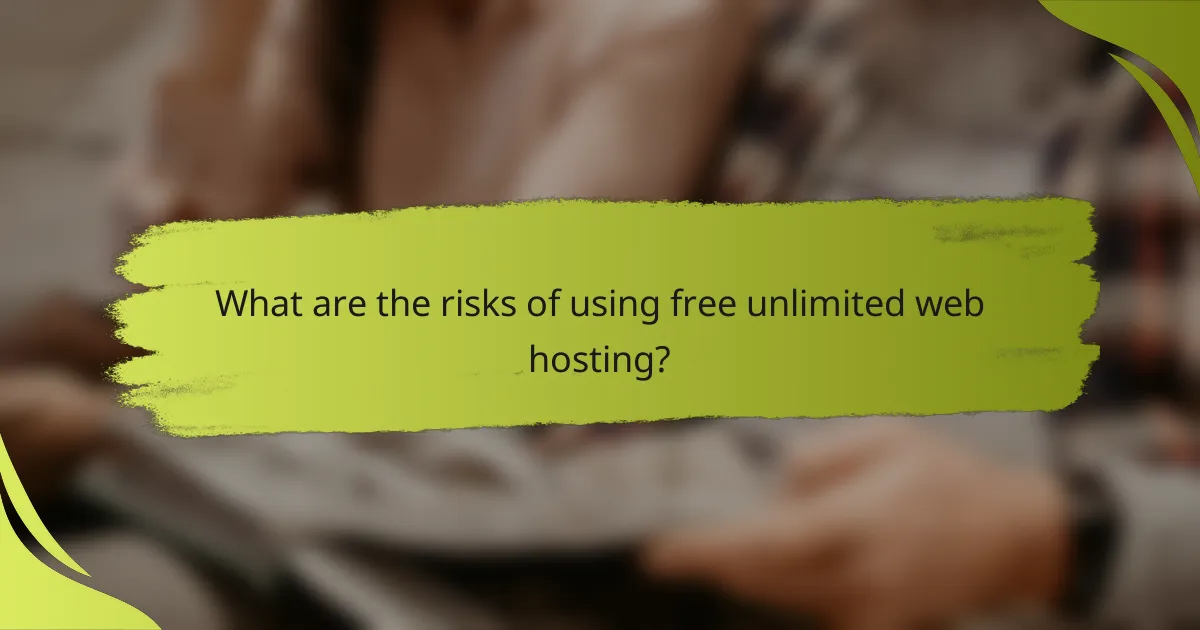
What are the risks of using free unlimited web hosting?
Free unlimited web hosting often comes with significant risks, including inadequate security measures, increased susceptibility to cyberattacks, and potential data loss. Users should be aware that these platforms may not provide the same level of protection as paid hosting services.
Limited security features
Free unlimited web hosting typically offers minimal security features, which can leave your website exposed. Commonly absent protections include firewalls, SSL certificates, and regular security updates. Without these essential tools, your site is more likely to be compromised.
When selecting a free hosting provider, check for any available security measures. If the service lacks basic protections, consider alternatives or be prepared to implement additional security layers yourself.
Higher vulnerability to attacks
Websites hosted on free platforms are often prime targets for hackers due to their lack of robust security. These services may host multiple sites on the same server, increasing the risk of cross-site vulnerabilities. A single breach can affect many users simultaneously.
To mitigate this risk, regularly update your website’s software and plugins. Use strong passwords and enable two-factor authentication whenever possible to enhance your site’s defenses against attacks.
Data loss potential
Free unlimited web hosting can lead to significant data loss due to unreliable backup systems. Many providers do not offer automatic backups, meaning that if your site goes down or is compromised, recovery options may be limited or nonexistent.
To protect your data, consider implementing your own backup strategy. Regularly save copies of your website files and databases to an external storage solution. This proactive approach can help you recover quickly in case of an incident.

Which free hosting providers offer better security options?
Some free hosting providers offer enhanced security features that can significantly protect your website. InfinityFree, 000webhost, and Freehostia are notable options, each with unique security measures to consider.
InfinityFree security features
InfinityFree provides several security features, including free SSL certificates to encrypt data between users and the server. They also offer a robust firewall that helps protect against common web threats.
Additionally, InfinityFree employs a system that automatically scans for malware and vulnerabilities, ensuring that your website remains secure. However, users should still implement their own security practices, such as regular backups and strong passwords.
000webhost security measures
000webhost includes essential security measures like daily backups and a built-in website firewall. This helps to mitigate risks from attacks and ensures that your data is recoverable in case of an incident.
Furthermore, 000webhost offers a unique feature called “Account Verification,” which adds an extra layer of security by confirming the identity of users. It’s advisable to take advantage of these features to enhance your site’s protection.
Freehostia security protocols
Freehostia implements various security protocols, including free SSL certificates and a comprehensive anti-virus system that scans files for malware. Their platform also features a secure login process to help prevent unauthorized access.
Moreover, Freehostia provides users with the option to enable two-factor authentication, which adds an additional layer of security. Utilizing these protocols can significantly reduce the risk of security breaches on your website.
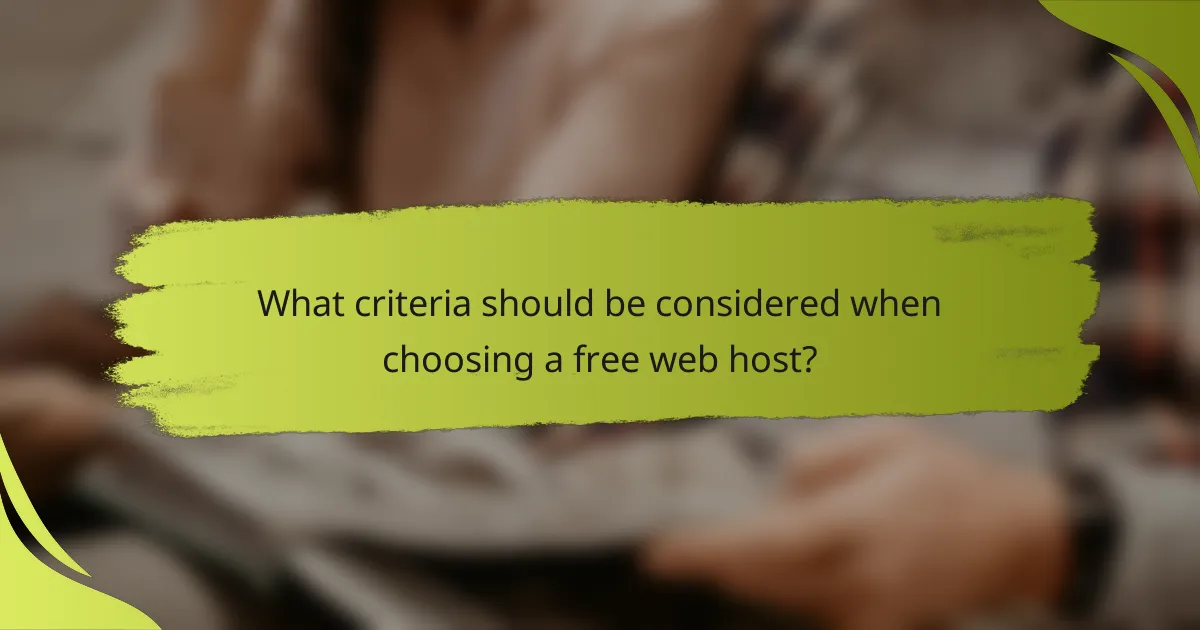
What criteria should be considered when choosing a free web host?
When selecting a free web host, prioritize security features, reliability, and user support. Look for hosts that offer essential security measures, such as SSL certificates and regular backups, to protect your website and data.
Security features comparison
Security features vary significantly among free web hosting providers. Key elements to compare include SSL encryption, firewall protection, malware scanning, and backup solutions. A host that provides these features can help safeguard your website from common threats.
For instance, some providers may offer free SSL certificates, which encrypt data between the user and the server, while others may not. Additionally, check if the host includes automated backups, as this can be crucial for data recovery in case of a breach or data loss.
When evaluating security, consider the trade-offs. Free hosts may have limited resources, which can affect the robustness of their security measures. Always read user reviews and terms of service to understand the level of support and security you can expect.
